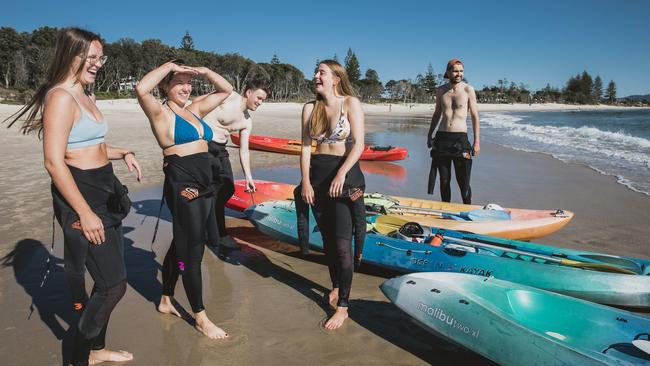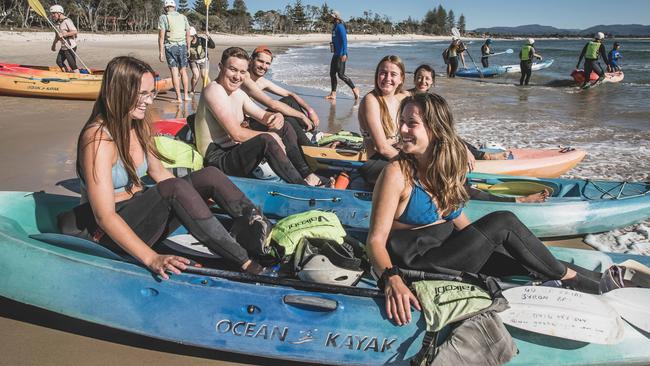Fears over visa changes smashing the backpacker economy
Farms and tourist towns face a backpacker exodus, with visa costs soaring to $640 and the Albanese government considering cutting permits for working holidaymakers.

Farms and tourist towns are fearing a backpacker exodus with visa costs soaring to $640 and the Albanese government considering a migration review recommendation to limit permits for working holidaymakers to one year.
In a move industry leaders warn could restrict the number of backpackers entering Australia, the government will increase the cost of WHM visas by $130 from Saturday.
With farmers, hospitality and accommodation providers reporting labour shortages, losing access to backpackers who contribute more than $3bn to the economy would deliver a major blow across regional Australia.
WHM visa holders currently can apply for a second and third visa to extend stays if they commit to three months of “specified work” in regional Australia.
Opposition immigration spokesman Dan Tehan said similar visa schemes overseas are considerably cheaper than the new WHM fee, ranging from $120 to $382 in Britain, Canada, New Zealand and Germany.
The migration system review, released by Home Affairs Minister Clare O’Neil in April, recommended the government consider limiting WHM visas to one year and returning the program to its “original intention”.
National Farmers Federation chief executive Tony Mahar said he was concerned changes to the WHM visa would disincentivise travellers from applying for their second-year visa, exacerbating the already “significant challenge in getting labour on to farms”.
“We’ve been talking to the government about the shortages facing the agriculture sector, and the niche role that the working holiday visa plays,” Mr Mahar said.
“It’s a critical part of the system, so the last thing we want is for further obstacles to be put in place and further barriers … We’re really concerned that it might have a detrimental impact on rural and regional communities that rely on the flow of people through businesses, as well as agriculture businesses.”
Immigration Minister Andrew Giles said a $50m budget investment in visa processing meant “working holidaymaker visa applications are now turned around in just two days”.
Across 2022-23, the government has granted more than 200,000 WHM visas, with just over 137,000 working holidaymakers in the country as at June 1, on par with pre-Covid levels of just over 137,000 in March 2020.
The Albanese government is yet to officially respond to the migration review and has stressed that recommendations are not government policy.
Mr Giles said since last year’s election, the government has “worked to clean up the backlog of almost one million visas left by the former Liberal government”.
Mr Tehan accused Labor of “making backpackers the scapegoat for their big Australia policy”, with the Coalition claiming 1.5 million will arrive in the country over the next five years.
He warned that changing WHM rules would devastate the tourism, hospitality and agriculture sectors, and lead to higher costs being passed on to locals.
“Anthony Albanese’s only plan to curb the record arrivals is to target backpackers. It’s unbelievable that Labor is even thinking about winding back the Working Holiday Maker program when backpackers spend the most time in regional Australia, do the jobs that Australians don’t want to do, and go home when their visa expires,” Mr Tehan told The Australian.
German backpacker Nele Wagner, 21, who has been travelling from Cairns to Sydney and stopped in Byron Bay on the weekend for a kayaking lesson, plans to return to Australia next year on a working holiday visa.
“If you come here as a backpacker soon after you finish your studies, when you don’t have a lot of money, you want to be as cheap as possible. It means some people may not have the same financial means to come here,” she said.

AUSVEG public affairs national manager Lucy Gregg said backpackers provided a vital surge workforce in the agriculture industry in seasonal harvests. In its submission to the migration review, AUSVEG said the nation’s $15bn horticulture industry was experiencing a labour shortage of approximately 10,000 workers.
“Backpackers are an important part of that skills matrix that we have,” Ms Gregg said. “Certainly any change of that working holidaymaker visa would have a significant and dramatic impact on our industry.”
Tourism & Transport Forum chief executive Margy Osmond said hiking the price of WHM visas could steer backpackers to countries where visas are cheaper.
“We’re worried this will be a disincentive to visit Australia for young people who are particularly price-sensitive,” she said.
Ms Osmond said compounding these issues was the cutting of WHM visa numbers by 30 per cent from July, when a one-year program designed to boost backpacker numbers is due to cease “We’re still struggling to find enough skilled workers to keep up with demand. These stricter limits could further hurt our industry and make it harder to maintain the quality of service we provide”.



To join the conversation, please log in. Don't have an account? Register
Join the conversation, you are commenting as Logout